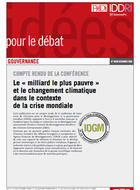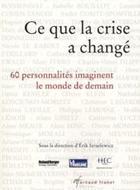CCICED Presentation :
The China Council for International Cooperation on Environment and Development is a high level, non-governmental advisory body, established in 1992 by the Chinese Government.
The main tasks of CCICED are:
- exchanging and disseminating international successful experience in the fields of environment and development;
- studying key environment and development issues in China;
- providing the Chinese leadership and policy maker in different levels of government with proactive, strategic precautious policy recommendations on key environment and development issues;
- supporting and facilitating the implementation of sustainable development strategy and development of a resource saving and environment-friendly society in China.
The China Council has now entered its fourth phase (2007-2011).
CCICED is composed of 40-50 Chinese and International Council Members in each phase. Task forces and Special Policy Studies are established during each phase.
Task Force "Energy efficiency and urban development" :
The Task Force "Energy efficiency and urban development - For policy recommendations to the China Council for International Cooperation on Environment and Development (CCICED)" was launched in 2008. Laurence Tubiana, director of IDDRI, and Pr Jiang Yi, director of the Building Energy Research Center at Tsinghua University, are co-chairs of this Task Force.
The general objective of the Task Force was to address the energy dimensions of the urban development in China in the perspective of sustainability.
In industrialised countries, the share of building and transport in total energy consumption has been growing steadily along with the GDP per capita for the last four decades. In OECD as well as in the EU, energy consumption in building and transport is today close to two thirds of total energy consumption. The main drivers of these evolutions have been consumption patterns and urban sprawl, which are closely inter-related. The challenge is now to build societies in a world of high energy prices: patterns of urban development, together with infrastructure choices, will determine energy demand trends in the long run.
International experts conducted studies on policies and measures to be implemented in order to disconnect urban energy consumption and economic development, while satisfying people’s increasing demand for comfort. The results of this international research cooperation affecting various sectors (urban planning, construction, transportation, sociology, etc.) made it possible to compare the development tracks of various countries in an effort to seek the development model tailed to China.
The Task Force's conclusions address urban energy consumption patterns and the measures China should take regarding urban planning, architecture, heating and transportation in urban areas. The findings were included into the CCICED’s recommendation report submitted to the Chinese government in November 2009 and sent to the ministries and provincial governments concerned at the same time.
Members of the Task Force :
- Prof. Yi JIANG, Member of China Academy of Engineering, Building Energy Research Center, Tsinghua University, China, TF Chinese co-chair.
- Prof. Qizhi MAO, Vice-Dean, School of Architecture, Tsinghua University, China
- Prof. Lijie FANG, School of Humanities and Social Sciences, Tsinghua University, China.
- Prof. Ye QI, Director of Tsinghua University Institute of Public Policy and the Global Sustainability Institute, China.
- Dr. Yulin JIANG, Deputy Chief Engineer, Chinese Academy of Transportation Sciences, Ministry of Communications, China.
- Laurence TUBIANA, Director of IDDRI, TF International Co-Chair, France.
- Bertrand CHATEAU, Director of Enerdata, France.
- Albert BRESSAND, Executive Director of Columbia University's Center for Energy, Marine Transportation and Public Policy (CEMTPP), United States.
- Shobhakar DHAKAL, Executive Director of Global Carbon Project, National Institute for Environmental Studies, Japan.
- Nick EYRE, Jackson Senior Research Fellow at Oriel College Oxford, Environmental Change Institute, University of Oxford, United Kingdom.
- Lucienne KROSSE, Technologies, Comfort, Energy and Health, TNO, The Netherlands.
- Partha MUKHOPADHYAY, Centre for policy research, New Dehli, India.
- Mark MAJOR, European Commission.
Coordinators :
- Carine BARBIER, Program Officer Energy and Climate Change, IDDRI, France.
- Borong LIN, Dr. Assoc. Prof. Building Energy Research Centre, Tsinghua University, China.




